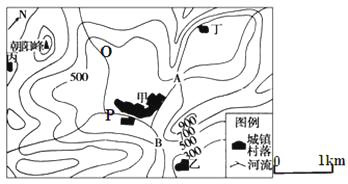问题
问答题 案例分析题
下图为我国南方某区域等高线地形图(单位:m),读图回答下列问题。

甲、乙、丙、丁四个村镇中,哪一处发生滑坡的可能性更高,请说明原因。
答案
参考答案:
丁;丁处附近等高线密集,该处的山体坡度较陡。
解析:
丁处等高线密集,坡度较陡,位于东南风的迎风坡,发生滑坡的可能性大。
考点:主要考查了地图的基本知识、等高线的相关知识。
下图为我国南方某区域等高线地形图(单位:m),读图回答下列问题。

甲、乙、丙、丁四个村镇中,哪一处发生滑坡的可能性更高,请说明原因。
参考答案:
丁;丁处附近等高线密集,该处的山体坡度较陡。
解析:
丁处等高线密集,坡度较陡,位于东南风的迎风坡,发生滑坡的可能性大。
考点:主要考查了地图的基本知识、等高线的相关知识。